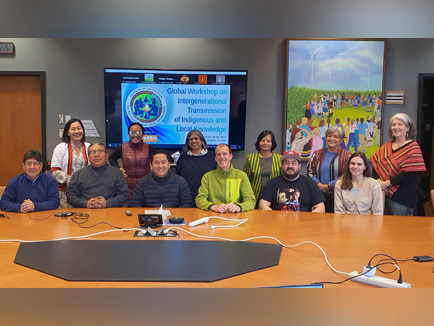Indigenous and local knowledge has been recognized by the Intergovernmental Science-Policy Platform on Biodiversity and Ecosystem Services (IPBES) as the basis of indigenous and local communities’ decision-making on matters affecting their health, education, food, and other economic and social activities, in addition to being the driver of innovative indigenous and local solutions to related problems such as climate change, unsustainable development, and pandemics. It is thus vital that indigenous and local knowledge are transmitted to present and
future generations. At the heart of indigenous and local knowledge transmission is communication, thus avenues such as global meetings, dialogue, workshops, and related forms of learning exchange within an environment of mutual support and understanding play a key
role in enabling indigenous and local communities to collectively reflect, analyze, and co-create learning and knowledge.
To this end, a three-day Global Workshop on Transmission of Indigenous and Local Knowledge, organized by the Centers of Distinction on Indigenous and Local Knowledge (COD-ILK) was held from November 28 to 30 in Montreal, Canada at the Kahnawake Mohawk Territory.
Participants were members of the COD-ILK network, resource persons, as well as indigenous peoples involved in research, policy development, and program and project implementation and management in relation to safeguarding and transmission of indigenous and local
knowledge.
The Workshop showcased a broad array of progressive indigenous knowledge systems in connection to transmission of indigenous and local knowledge. There were also sharing of lived experiences in indigenous and local knowledge transmission through arts, language, rituals, and
research. Groups held discussions on the continuing issues and challenges in indigenous and local knowledge transmission. Of note were those on traditional and new ways of learning with children and young people, older people, and the general public, such as story-telling, spirit-
based knowledge transmission, land-based learning, and use of creative media such as films, video, and comics.
The Global Workshop concluded with participants defining the ways forward in sustaining collective action to ensure protection of indigenous and local knowledge and engaging with global and related processes. To quote Simon Ndonco Mitambo, Co-Founder and Chief Executive Officer of the Society for Alternative Learning & Transformation (SALT), The exchanges we have had inspire us to work hard in reviving our knowledge and practices, and in the process, keep the stories alive, to be shared, which then become opportunities to affirm identity and inspire others to join in the movement.

